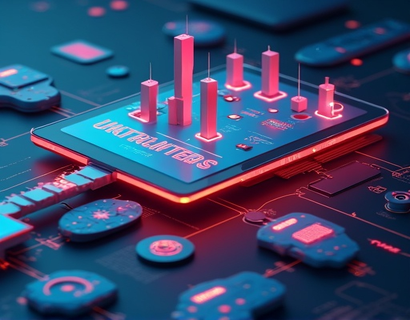Unlocking Advanced Digital Transformation: The Synergy of Crypto and AI
The intersection of cryptocurrency and artificial intelligence (AI) is catalyzing a new era of digital transformation, one that promises to revolutionize user experiences across app ecosystems. This convergence is not merely a technological curiosity but a powerful force driving innovation and efficiency. As tech-savvy innovators and early adopters, understanding the dynamics of this synergy is crucial for harnessing its potential. This article delves into the transformative impact of merging these two advanced technologies, offering insights into how they are reshaping digital landscapes and enhancing user interactions.
The Foundations of Cryptocurrency and AI
Cryptocurrency, since its inception with Bitcoin in 2009, has evolved from a niche digital currency to a foundational element of the modern financial and technological infrastructure. It operates on blockchain technology, a decentralized ledger that ensures transparency, security, and immutability. This technology underpins not just currencies but a wide array of applications, from smart contracts to decentralized finance (DeFi) platforms.
Artificial intelligence, on the other hand, encompasses a range of technologies designed to simulate human intelligence processes, including learning, reasoning, and self-correction. AI algorithms can analyze vast amounts of data, identify patterns, and make decisions with minimal human intervention. The integration of AI into various sectors has led to significant advancements, from healthcare and finance to entertainment and education.
The combination of cryptocurrency and AI leverages the strengths of both technologies. Cryptocurrency provides a secure, decentralized, and transparent medium for transactions, while AI enhances the functionality and user experience of applications built on these networks. This synergy is particularly potent in app ecosystems, where user engagement and trust are paramount.
Enhancing Security and Trust
One of the most significant benefits of integrating AI with cryptocurrency is the enhancement of security and trust in digital transactions. AI algorithms can detect and mitigate fraudulent activities in real-time, analyzing transaction patterns and user behavior to identify anomalies. This proactive approach to security is crucial in an environment where cyber threats are increasingly sophisticated.
Smart contracts, powered by blockchain, can be augmented with AI to automate and enforce contractual obligations more efficiently. AI can ensure that all conditions of a smart contract are met before execution, reducing the risk of disputes and errors. This combination not only secures transactions but also builds trust among users, a critical factor in the adoption of new technologies.
Personalized User Experiences
AI-driven personalization is a game-changer in app ecosystems. By analyzing user data, AI can tailor content, recommendations, and interactions to individual preferences, creating a more engaging and relevant experience. In the context of cryptocurrency and app ecosystems, this means users can access services and applications that are finely tuned to their needs and behaviors.
For instance, a decentralized finance (DeFi) platform can use AI to offer personalized investment strategies based on a user's risk tolerance, investment history, and market trends. This level of personalization not only enhances user satisfaction but also increases the likelihood of user retention and engagement.
Optimizing App Performance
AI can significantly improve the performance of applications built on cryptocurrency networks. By predicting and optimizing network conditions, AI can ensure smoother transactions and faster processing times. This is particularly important for applications that require high transaction throughput, such as online marketplaces and gaming platforms.
Machine learning algorithms can analyze network traffic and resource usage, dynamically adjusting parameters to maintain optimal performance. This adaptive approach ensures that users experience minimal delays and interruptions, even during peak usage times. The result is a seamless and efficient user experience that keeps users coming back.
Innovative Business Models
The convergence of cryptocurrency and AI is giving rise to innovative business models that redefine how value is created and distributed. Decentralized autonomous organizations (DAOs) are a prime example, leveraging AI to manage and optimize their operations. These organizations operate without central authority, relying on smart contracts and AI-driven decision-making to allocate resources and make strategic decisions.
AI can also enhance token economics within app ecosystems. By analyzing user behavior and market dynamics, AI can help design token incentives that align user actions with the goals of the platform. This ensures that users are motivated to contribute value, whether through content creation, moderation, or other forms of engagement.
Data Privacy and User Control
Data privacy is a growing concern in the digital age, and the combination of cryptocurrency and AI offers solutions to enhance user control over personal data. Blockchain's decentralized nature ensures that data is not stored in a single, vulnerable location, reducing the risk of breaches. AI can further empower users by providing tools to manage and monetize their data.
Users can grant selective access to their data to applications, ensuring that their privacy is respected while still enabling personalized experiences. AI can also help anonymize data, making it useful for analytics without compromising individual identities. This balance between utility and privacy is essential for building trust and fostering wider adoption of cryptocurrency-powered apps.
Challenges and Considerations
While the potential of merging cryptocurrency and AI is vast, there are challenges that must be addressed. Regulatory uncertainty remains a significant hurdle, as governments worldwide grapple with how to govern these emerging technologies. Compliance with varying regulations is crucial to ensure that applications remain legal and accessible.
Technical complexity is another consideration. Developing and maintaining AI-driven cryptocurrency applications requires specialized skills and resources. Developers must stay updated with the latest advancements in both fields to create robust and secure solutions. Additionally, the energy consumption associated with blockchain and AI processes raises environmental concerns that need to be mitigated through sustainable practices.
Future Prospects
The future of cryptocurrency and AI is bright, with numerous opportunities for further innovation. As technology advances, we can expect more sophisticated AI algorithms that enhance the functionality of blockchain networks. The integration of AI with other emerging technologies, such as the Internet of Things (IoT) and 5G, will create even more seamless and intelligent app ecosystems.
For tech professionals and early adopters, staying at the forefront of this synergy is essential. Continuous learning and experimentation will be key to unlocking new possibilities and driving the next wave of digital transformation. The potential for creating more intuitive, secure, and personalized digital experiences is immense, and those who embrace this convergence will be well-positioned to lead the way.
In conclusion, the merging of cryptocurrency and AI is not just a technological trend but a fundamental shift in how we approach digital interactions. By enhancing security, personalizing user experiences, optimizing performance, and innovating business models, this synergy is reshaping app ecosystems in profound ways. As we move forward, the collaboration between these advanced technologies will continue to unlock new frontiers, offering exciting opportunities for all involved.










































